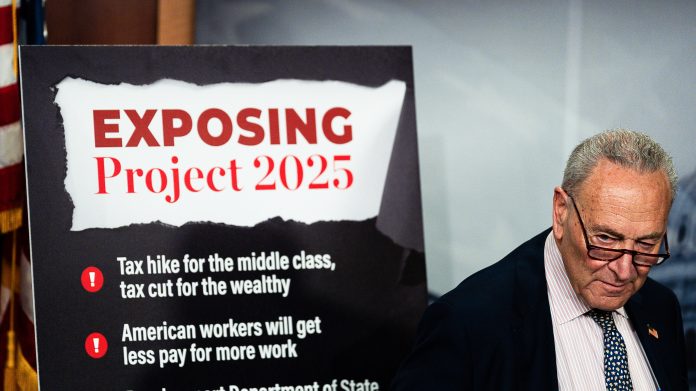Flying under the media radar, the Heritage Foundation—a think tank widely viewed as the intellectual engine behind the Trump administration’s foreign policy agenda—has published a brief that appears to map out the president’s prospective approach to Iran.
The six-page document advocates ending nuclear negotiations and pursuing joint U.S.-Israeli strikes against Iran’s nuclear infrastructure. Though thinly veiled as a policy analysis, the brief reads more like a soft launch for a war strategy.
Heritage has long played a predictive role in Trump-era foreign policy. Its reports and recommendations often find their way into official doctrine, especially on issues involving Israel and Iran. That’s what makes this document, titled “Eradicating Iran’s Nuclear Program,” so significant: it not only outlines what Washington should do, but when and how it should do it.
It opens with a glaring historical error, stating that “The Islamic Republic of Iran has had a nuclear program since the 1950s, with a military dimension beginning in the late 1980s.” Iran was a monarchy until 1979, when a grassroots revolution brought about a change in leadership.
More troubling, however, are its prescriptions. The authors endorse the Trump administration’s current posture, insisting the U.S. uphold the red line set by Middle East envoy Steve Witkoff: that Iran will not be allowed to retain even “1% of an enrichment capability.” Tehran has dismissed this demand as a non-starter.
The brief argues that only a credible threat of military action can force Iranian concessions. If that fails, it claims, a joint Israeli-American strike is both viable and necessary. The authors recommend setting a firm end date for negotiations prior to October 25, when the JCPOA’s snapback sanctions provision is set to expire.
But experts familiar with the region have warned that strikes on Iranian nuclear facilities would, at best, delay the program temporarily and could provoke major regional blowback. In April, U.S. and Israeli military analysts stated that such action might escalate into full-scale war.
The Heritage Foundation, however, assures readers that the U.S. and Israel have the capability to “effectively end Iran’s nuclear program without significant civilian casualties” and “deter significant retaliation.”
These claims are not only unsupported but also contradicted by recent battlefield data.
The brief asserts, without evidence, that Iran’s air defenses have been “decimated.” It also claims Hezbollah has been “decapitated” and Hamas “gutted.” In reality, Israeli estimates place Hamas’s active manpower at roughly 40,000, unchanged since before October 7. Hezbollah remains operational. And Ansar Allah (Houthis) continue to launch near-daily missile strikes despite months of U.S. and allied bombardment.
This isn’t mere misanalysis. It’s narrative warfare. By portraying key regional actors as already neutralized, the Heritage brief constructs a fantasy scenario in which war appears low-cost, high-reward, and all but inevitable.
What’s most alarming is not the errors—it’s the pattern. The brief echoes talking points from pro-Israel think tanks like the Washington Institute for Near East Policy (WINEP), which recently claimed that Iran’s “current weakness” represents a “unique opportunity” to strike. Together, these voices are shaping a consensus built upon deeply flawed assumptions.
The Heritage Foundation has played a central role in shaping the policy direction of Trump’s second term, most notably through Project 2025. Viewed in that context, this Iran brief appears less like an analysis and more like a policy marker, an indication of how military strategy may be formalized in the coming months.
Feature photo | President Donald Trump speaks at the Heritage Foundation’s annual President’s Club meeting in Washington on Oct. 17, 2017. The Heritage Foundation, author of the controversial Project 2025 blueprint, recently published a policy brief outlining a potential roadmap for U.S.-Israeli military strikes on Iran’s nuclear program. Pablo Martinez Monsivais | AP
Robert Inlakesh is a political analyst, journalist and documentary filmmaker currently based in London, UK. He has reported from and lived in the occupied Palestinian territories and hosts the show ‘Palestine Files’. Director of ‘Steal of the Century: Trump’s Palestine-Israel Catastrophe’. Follow him on Twitter @falasteen47
The post The Think Tank Behind Project 2025 Just Published Trump’s Iran War Plan appeared first on MintPress News.
